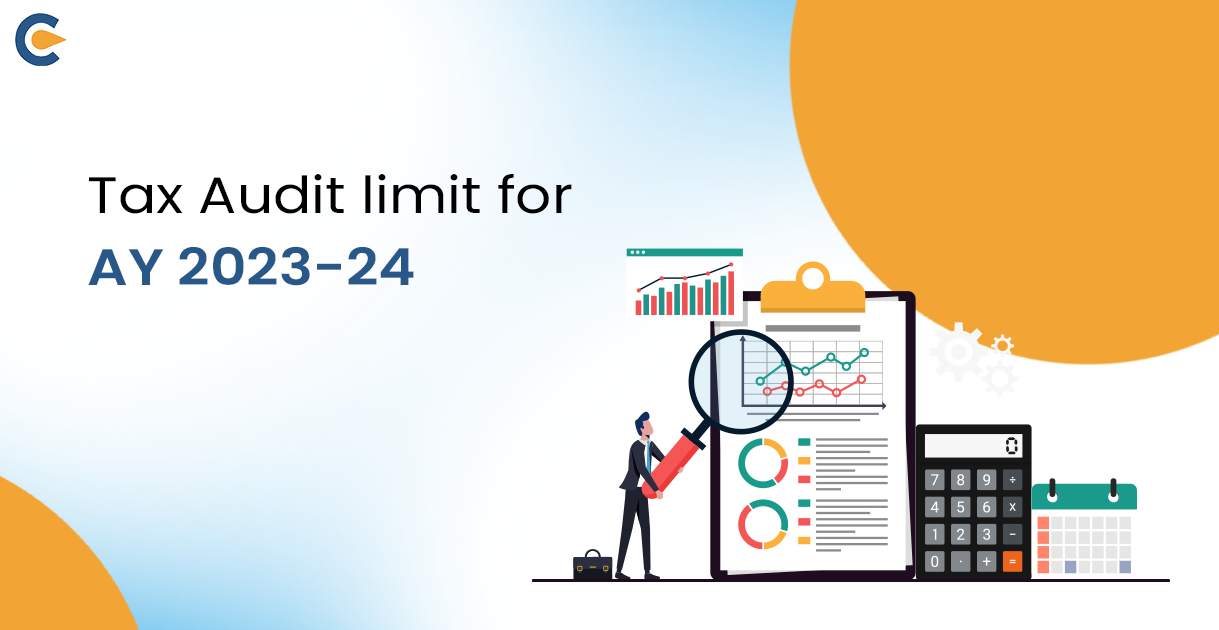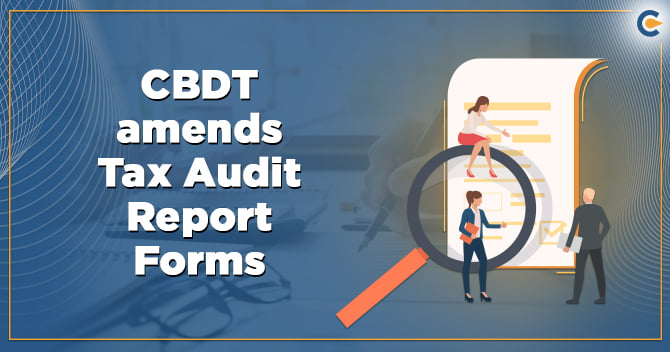The tax Audit Limit for AY 2023-24 serves as a crucial benchmark in the constantly changing field of fiscal legislation, dictating the extent and suitability of audits for both people and corporations. These criteria, which are subject to periodic modifications, represent the financial levels that, in accordance with the Income Tax Act, require an audit. Taxpayers must be aware of these limitations in order to guarantee compliance and successfully negotiate the complex world of tax assessment. Let’s examine the new criteria, modifications, and importance of the Tax Audit limitations for financial year audit and statutory audit limits in the context of financial governance.
What is a Tax Audit?
According to Section 44AB of the Income Tax Act of 1961, everyone in a given profession or with more than a certain quantity of commercial activity must have a chartered accountant to examine their account books.
An audit is the process of reviewing or examining book accounts to ensure they adhere to the Income Tax Act and other relevant rules and to look for fraudulent activity. Numerous types of audits are carried out in accordance with different laws, including stock audits, cost audits, and business audits or statutory audits carried out in accordance with company law regulations. Similarly, income tax legislation also requires what is known as a “Tax Audit.”
Income Tax Audit Limit for AY 2023-24
The income tax audit limit for AY 2023-24 is different for different businesses, depending upon the type of organisation, business activity, and revenue:
- A business owner whose sales, turnover, and gross revenues for the preceding fiscal year were more than Rs. 1 crore.
- The audit limit for AY 2023-24 for the individual who chooses a section 44AD presumed taxation plan is no longer applicable. The individual’s overall revenue or turnover would not surpass two crore rupees.
- A professional with above Rs. Fifty lakhs in gross earnings from the preceding fiscal year.
- Individuals covered by Sections 44AD, 44AE, 44AF, 44BB, and 44BBB reported less revenue from their businesses than they had anticipated.
- The most recent revision states that an increase in the audit limit is available to those conducting most of their business online.
| Criteria | Limit (in Rs.) |
| Businesses with less than 5% cash transactions | One crore |
| Businesses with more than or equal to 5% cash transactions | Ten crores |
| Professionals with gross receipts in the previous FY | 50 lakhs |
| Presumptive taxation scheme under Section 44AD | Two crores |
Objectives of Tax Audit
The objects of tax audit and ascertaining audit limit for AY 2023-24 are mentioned below:
- Make sure the books of accounts are kept up to date, accurate, and certified by a tax auditor.
- Reporting the findings and mistakes that the tax auditor found after carefully going over the books of accounts
- To submit required data, including tax depreciation and conformity with different income tax laws, among other things.
These objectives of audit limit for AY 2023-24 help tax authorities confirm that the income tax returns that taxpayers complete are accurate. It also makes it easier to calculate and verify total income, file claims for deductions, and calculate the tax audit threshold, etc.
Types Of Tax Audits
The auditing process consists of three different types of audits. They are listed below:
- Field audit: The audit is carried out at the business’s headquarters. All required paperwork is needed to guarantee a successful audit.
- Office audit: The IRS office is the site of the audit. For the audit, all relevant papers are needed, and a letter specified in the documentation has to be received.
- Correspondence audit: In this instance, the individual made sure to ship the necessary papers to the specified location after receiving a letter outlining the documents needed for the auditing procedure.
Applicability of Tax Audit Limit for AY 2023-24
The applicability of the tax audit limit for 2023-24 is mentioned below:
For Businesses
- A tax audit limit for AY 2023-24 is not necessary if a company’s gross revenues or turnover exceeds Rs. 1 crore but is less than Rs. 10 crore and less than 5% of transactions are cash-based.
- Regardless of the proportion of cash transactions, a firm needs to have a tax audit limit for AY 2023-24 if its gross revenues or sales surpass Rs. 10 crores.
- The general turnover ceiling for enterprises that want to use section 44AD for presumptive taxes is raised to Rs. 2 crore for a financial year audit. Additionally, tax audits apply to businesses protected by sections 44AD, 44AE, 44AF, 44BB, and 44BBB whose revenue exceeds the basic exemption level and whose declared profits are expressed as a percentage of turnover that is below the required limit.
- Claimed profits are less than the presumptive taxation scheme’s stipulated limit.
- Under the presumptive tax structure, taxable income is disclosed over the basic tax audit threshold limit but below the statutory restrictions.
- Only income falling within the maximum amount not taxed in the next five years after the date is eligible for the presumptive taxation plan.
For Professionals
- A tax audit is necessary if a professional’s gross receipts above Rs. 50 lakhs.
- A statutory audit is necessary if a professional claims to have made a profit below the specified tax audit threshold and is qualified for the presumptive taxation system under Section 44ADA.
Forms Required for Audit Report
The forms needed to submit an audit of a company or profession under Section 44AB are listed in Rule 6G of the Income Tax Act.The forms required to be submitted for an audit have been modified by the Income Tax Act (7th Amendment) Rules of 2014. Forms 3CA, 3CB, and 3CD have been modified by the Central Board of Direct Taxes to require the auditor to provide the audit report’s observations or qualifications while completing the forms.
- A businessperson or professional must fill out Form 3CA (Audit Form) and Form 3CD (Statement of Particulars) appropriately if they are required by law other than the Income Tax Act to audit their accounts.
- Moreover, Form 3CB (Audit Form) and Form 3CD are used by professionals and business owners who are required by the Income Tax Act to audit their accounts.
Let’s say a taxpayer is required by many laws to conduct a company audit. They can submit an identical audit report for pertinent review. When e-filing the IT Return, the audit report must be attached.
Penalty for Non-Complying with Audit Limit for AY 2023-24
If a tax audit is necessary and the assessee neglects to have his account audited, a penalty equal to 0.5% of the whole sales, turnover, or gross receipts, or Rs. 1,50,000, will be assessed. The consequences of failing to comply with anaudit limit for AY 2023-24 are severe. You should speak with a chartered accountant if you need to have a tax audit.
The following are some of the factors that make failing to comply with a tax audit potentially serious:
- Penalties from the tax authorities may result from it.
- In the case of astatutory audit, it might be more challenging to defend oneself.
- Your reputation with the tax authorities may suffer as a result.
- Obtaining loans or other financial products may become more challenging as a result.
It’s crucial to follow the guidelines if you’re asked to participate in a tax audit. By doing this, you can make sure that your tax affairs are in order and that you stay out of trouble with the law.
How can Corpbiz help you understand the Audit Limit for AY 2023-24?
Corpbiz provides up-to-date information on the audit limit for AY 2023-24, together with professional advice. They ensure compliance by providing paperwork help and clarifying requirements through individual consultations. Get customised solutions and instructional materials to understand how Audit Limits affect your taxes. With Corpbiz’s specialist services, you can stay informed, compliant, and empowered while gaining a thorough grasp of the audit limit for AY 2023-24.
Frequently asked questions
For enterprises with more than 5% in cash transactions, the audit limit for AY 2023-24 is Rs. 1 crore.
An independent assessment and review of an organisation’s financial accounts is known as a financial year audit, and its purpose is to make sure that the financial records fairly and accurately reflect the transactions they purport to represent.
If a taxpayer’s business’s sales, turnover, or gross revenues for the financial year exceed Rs 1 crore, the taxpayer must have a tax audit conducted. In some additional situations, a taxpayer could be obliged to have their finances audited.
A legally mandated examination of the correctness of a business’s financial statements and records is known as a statutory audit. The word “statutory” indicates that legislation has mandated the audit.
For firms that want to use the presumptive taxation method under Section 44AD, the presumptive tax limit for FY 23–24 is Rs. 2 crores.
Since the budget for FY 2024 – 25 has not yet been released, the tax audit limit is unknown. The tax audit limit, which is Rs. 1 crore for companies with more than 5% in cash transactions and Rs. 10 crore for those with less than 5%, is probably going to be the same as it was for the audit limit for FY 2023 – 2024.
The tax audit limit of Rs. 10 crore for companies with less than 5% cash transactions and Rs. 1 crore for those with more than 5% cash transactions is the same as the limit of an ITR audit.
Yes, provided that your total turnover or gross revenues do not exceed Rs. 50 lakh, you can report a profit below 8% without the need for an audit.
For FY 2023–2024, the 44AD turnover limit is Rs. 2 crores. As long as their entire sales or gross revenues do not exceed Rs. 2 crores, firms that choose to use the presumptive taxation plan under Section 44AD are free to disclose their earnings without having to have their books audited.
The tax audit report is done by the chartered accountant, and the report must be submitted in the required format.
The individual may request revisions to the audit report provided under this regulation by obtaining a revised report from an accountant that has been officially signed and confirmed by such accountant.
No, there is no higher chance of an audit even if you file your taxes late.
Yes, even in cases when turnover or gross receipts fall below the designated threshold, a taxpayer may freely choose to pursue a tax audit under Section 44AB.
Preliminary audits, sometimes referred to as planning phase audits or preliminary audit engagements, are the first steps in the auditing process in which the auditor conducts various tasks and procedures to get a sense of the client’s business, industry, and internal control systems.
Most personal tax audits may be completed in less than six months on average. For enterprises, it is contingent upon the kind, state, and precision of the documentation—furthermore, the Tax Representative’s proficiency.
Read Our Article: Rules Of Taxation In Securitization In India











